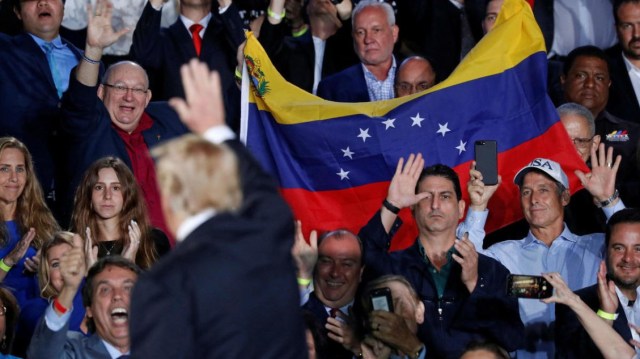
What does this election say about the politics of our Florida diaspora in Trump’s favorite state?
By Caracas Chronicle – Rafael Osío Cabrices
Nov 11, 2020
Miami, that party city, didn’t join the celebrations seen in NYC or Philadelphia when the networks called Joe Biden’s victory. The Democratic candidate won at Miami-Dade county – even if he lost Florida – but the Eta storm crashed the ball. Venezuelan writer Camilo Pino went out on Saturday night and only found rain everywhere: “There was some celebration downtown, but no great demonstrations.”
The rain was perhaps a metaphor for what happened: the Dems’ advantage in Miami shrank from 29% to 7%. With 1.5 million registered voters and 74.5% turnout, Biden won with 53.3% (617,647 votes), while Trump got 45.9% (532,734 votes) in Miami-Dade. “The Trump campaign message accusing Biden, and especially Kamala Harris, of being socialists, was heard,” Camilo says. “Even in Miami-Dade, where there’s a solid Democrat tradition, Dems couldn’t catch it on time. There’s also that appeal of Trump as a strongman among many Hispanic men. Florida slipped to the Right, in general, and that also happened in the heavily populated Miami-Dade. What made the difference was the Cuban-American vote, which added 200,000 to Trump. The Cuban vote is the most important, along with the Puerto Rican; about the Venezuelan vote, there’s no data: it amounts to 0.5% of the vote in Florida. It’s noisy, very rhetorical, and reinforced by the Cubans and maybe the Nicaraguans, regarding this story of socialism. But the relevant people here are the Cubans, not us.”
Hialeah Isn’t Doral
The poet and editor Kelly M. Grandal has a particular perspective on the matter: Kelly was born in Havana and now lives in Miami, but she didn’t come to Florida from Cuba – she hails from Caracas, where she lived for several years. She doesn’t have a very intense relationship with either the Cuban or the Venezuelan communities, but she says that although they’re close (for better and worse), they’re not at all the same: “The Cuban influence on Venezuela has its limits, as well as the Cuban-American community influences the Venezuelan-American community. I don’t think the Cubans in Miami made Venezuelans vote for Trump. It’s unfair to blame Florida Cubans for that, and it’s unfair to think the Florida Venezuelans have no politics of their own.”
Kelly agrees on saying that both communities, today, are predominantly pro-Trump, but disagrees with my perception that the Cubans who arrived in the ‘60s, expropriated and exiled by the triumph of the Revolution, are more Republican than those Cubans who arrived in recent years. “Among Cubans, it’s easier to find more Trump followers in the older generations. But I’ve seen all kinds of things and I’ve had to discard clichés. I’ve met old Cubans who respect the democratic thing and the defense of civil freedoms, and young people totally fanatic about Trump.
“Many Venezuelan right-wingers define themselves as liberals, ignoring what liberal means in America.”
“There are more differences. The Cuban community, concentrated in Miami, is quite solid and organized, and provides a lot of help to its newcomers – as long as you adapt to their terms,” says Kelly, while the Venezuelan is less organized and more dispersed throughout the U.S. Both communities, as all Hispanics in Florida, consume media in Spanish, mostly. “Social media must be the main source of influence amid Venezuelans in Miami, followed by local media and family or community networks. Local politicians have little grasp on them. I also think that the ‘this is a free country’ excuse makes people feel less inhibited to say anything without considering the consequences or wondering if it makes any sense. That community has become a comfort zone for those who aren’t fully integrated into the American society, those who try to preserve their identity no matter what, even if that means staying focused on the world you left.”
The Politics of Void
María Puerta Riera, professor of American government and international politics at Valencia College in Orlando, has re-lived with Trump the family conflicts she had when her father supported Chávez in Venezuela, but this context has helped her to understand the Hispanic vote in the U.S. During the research she has been doing with a Colombian-American colleague, she found that the Hispanic vote in Florida is different from the Hispanic vote in the rest of the country, and that the Venezuelan community in Florida has “an ideological void”.
“Many Venezuelan right-wingers define themselves as liberals, ignoring what liberal means in America,” says this political scientist. “For American conservatives, getting help from the state is helping the state grow, and that’s socialism. Venezuelans have demanded and enjoyed, until recently, a lot of benefits from the state in our country, such as subsidies. We are not conservatives!” Many reject the Democratic party using this contradictory position.
The professor says that the problem is that Venezuelans “have been void of ideological representation and are looking for a new strongman, which currently means Trump. They cannot tell the difference between communism and socialism, but we cannot expect that when our political parties didn’t even educate their members on such matters. The ideological definition is important to give you a frame of the things you’re defending.”
The other apparent contradiction is the support of a Trump administration that refused to give Venezuelans the Temporary Protection Status. But that doesn’t only happen to our people. “Venezuelans with U.S. citizenship don’t care if others stay in a migratory limbo,” Puerta Riera says, “you can see it in the polls. When I lived in Texas, when I was a child and my dad was studying there, the Mexicans didn’t help us because they felt the other Hispanics would take from them what they had struggled so hard to have.”
…
Read More: Caracas Chronicle – Understanding the Venezuelan vote in Florida
…

